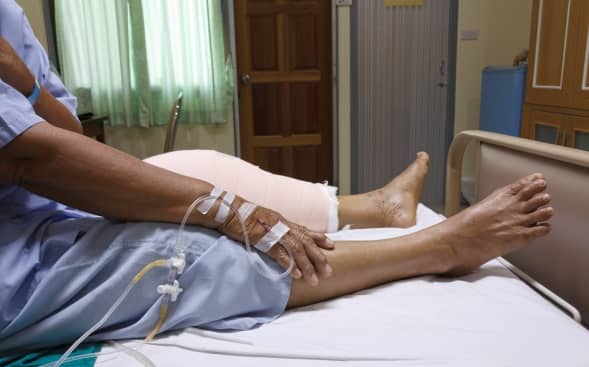
Med-Surg Nurses Affect Joint Replacement Readmissions
Good hospital nurse staffing levels and work environments can reduce readmissions following total hip or knee replacement surgery, according to a new study from the University of Pennsylvania School of Nursing's Center for Health Outcomes and Policy Research (CHOPR) in Philadelphia.
“We found surgical patients, specifically Medicare patients with elective hip and knee replacements, were less likely to be readmitted when cared for in hospitals with adequate staffing and a good work environment,” said Karen Lasater, PhD, RN, lead author and a postdoctoral fellow at CHOPR.
The data on joint replacements and readmissions
Nearly 1 million adults undergo hip and knee replacements each year. The Penn team found about 6 percent of the patients studied required readmission to the hospital within 30 days. Infection and blood loss are the two primary reasons for readmission. More than half of the rehospitalizations occurred within the first 10 days at home.
“These patients need a lot of care when they go home, with mobility, managing the wound and with the daily tasks of everyday living,” Lasater said. “Nurses in the hospital think through these and educate the patient about what to expect when home.”
Lasaster and Matthew McHugh, PhD, JD, MPH, RN, associate director of CHOPR, conducted a cross-sectional study, analyzing data from more than 112,000 Medicare patients in nearly 500 U.S. hospitals. They reported in the International Journal for Quality in Health Care that nurses on average cared for five patients per nurse.
Accounting for patient characteristics and hospital features, every additional patient in a medical-surgical nurse's workload was associated with an 8 percent increased likelihood of a patient being readmitted within 30 days of discharge following the surgery. The researchers did not report a “right level” of staffing.
The role of med-surg nurses
“Nursing is important for ensuring a good outcome,” Lasater said. “Nurses are the frontline provider of care with patients 24 hours a day in the hospital. They are continuously monitoring for early warning signs of complications, like infection and blood loss.”
While in the hospital, she explained, medical-surgical nurses monitor wound and temperature trends as they watch for early indications of infection. They also are responsible for educating the patient about how to manage the wound, what symptoms to watch for, and when to contact the physician, so a readmission is not needed.
Blood loss commonly occurs with joint replacement surgeries, and bleeding can result from blood thinning medications given to prevent deep vein thrombosis or gastrointestinal issues. Patients typically receive serial blood work to assess for blood loss. Nurses must monitor the trends in lab values, vital signs and physical status over time. But when nurses lack the time, patient care can be placed in jeopardy.
Nurse staffing, work environment & outcomes
Lasater said she was not surprised by the findings, because the relationship between outcomes and nurse staffing and work environment has been “found over and over in different populations and with different outcomes, such as mortality, patient satisfaction and readmissions.”
“These study findings are consistent with decades of prior research demonstrating the role hospital nurses play in ensuring safe outcomes for surgical patients,” agreed McHugh, the study’s senior author, in a written statement.
What was interesting about this work, as compared to previous studies with patients in heart failure, an acute myocardial infarction or pneumonia, is that these joint replacement patients were relatively healthy and could choose their hospital.
“The study is important because it tells you when deciding on where to get a hip or knee replacement done there could be consequences for the health outcome,” Lasater said. “Even in a relatively healthy population, we still see nurses have a big impact on health outcomes. The other thing to remember is the hospital is a dangerous life event, especially for older adults.”
The Centers for Medicare and Medicaid Services’ mandatory Hospital Readmission Reduction Program and Comprehensive Care for Joint Replacement Program are making hospitals financially accountable for patient outcomes, including readmission rates following elective hip and knee replacements. Reducing readmissions will be important for hospitals’ financial well-being.
“As we move forward, the pay-for-performance incentive will be more powerful, and I hope that results in changes in thinking about frontline providers,” Lasater concluded. “These surgery patients are less likely to be readmitted if they go to a hospital with better staffing and a better practice environment.”
Find travel med-surg jobs or apply today to get connected with a nurse recruiter.
Originally published on NurseZone.com.
© 2016. AMN Healthcare, Inc. All Rights Reserved.